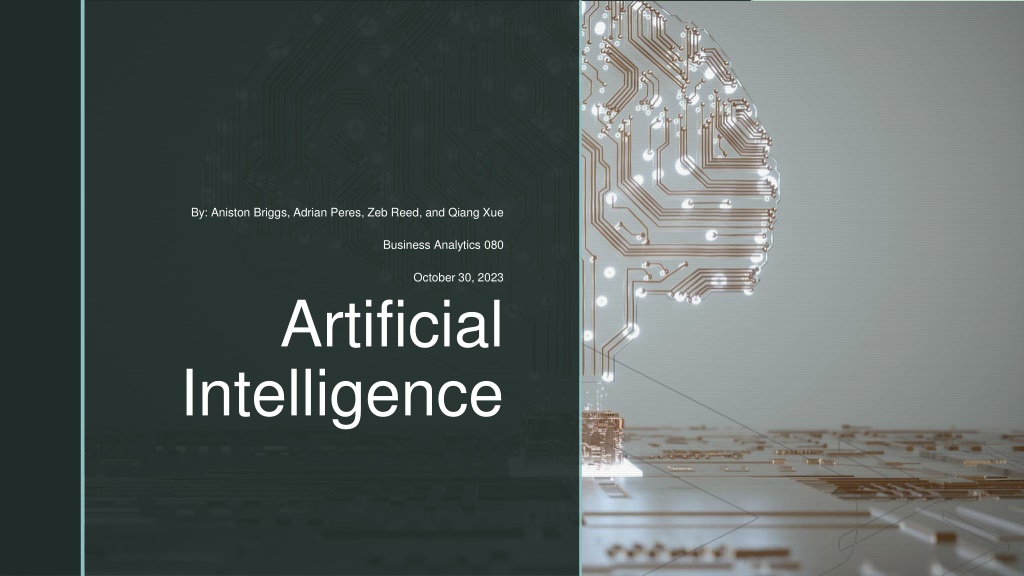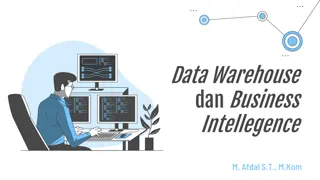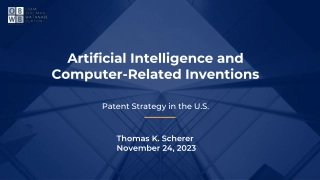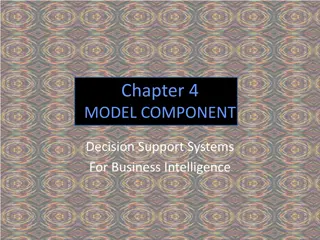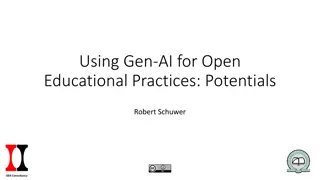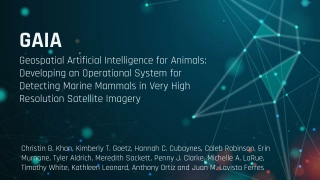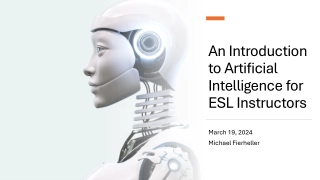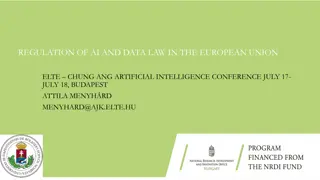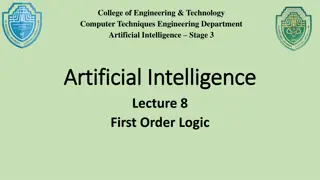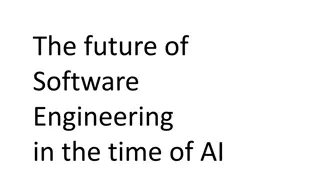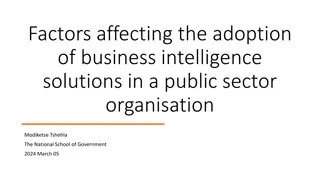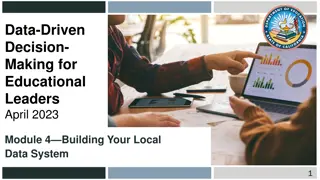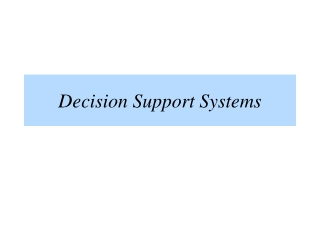Leveraging Artificial Intelligence for Enhanced Decision-Making
Artificial Intelligence (AI) is revolutionizing industries, from manufacturing to healthcare, by enhancing efficiency, productivity, and precision. This technology enables smarter and faster decision-making, minimizes errors, and provides personalized support in various aspects of life. While AI presents numerous benefits, understanding the risks associated with its adoption is crucial for modern organizations and individuals aiming to leverage its potential effectively.
Download Presentation
Please find below an Image/Link to download the presentation.
The content on the website is provided AS IS for your information and personal use only. It may not be sold, licensed, or shared on other websites without obtaining consent from the author. Download presentation by click this link. If you encounter any issues during the download, it is possible that the publisher has removed the file from their server.
Presentation Transcript
By: Aniston Briggs, Adrian Peres, Zeb Reed, and Qiang Xue Business Analytics 080 October 30, 2023 z Artificial Intelligence
z Introduction What is Artificial Intelligence (AI)? According to SimpliLearn, "Artificial Intelligence is machine- displayed intelligence that stimulates human behavior or thinking and can be trained to solve specific problems" According to Gartner Research, AI combines probability and logic to assign a value to uncertainty When was AI founded? 1950-1956
z About AI Industries expected to benefit most from AI in the future: Well-known examples of AI: Manufacturing Robots Healthcare Self-Driving Cars Transportation Virtual/Smart Assistants Siri, Alexa, ChatGPT Education Manufacturing Virtual Travel Booking Agent Finance Social Media Monitoring Marketing Chatbots
z Objective of Presentation Goal: to provide insight into what AI is and how you can find it helpful during work, school, and everyday life. By the end of this presentation not only do we hope you will be able to leverage AI, but also understand the analytic side of artificial intelligence.
z Why is AI important in the modern organization? Efficiency improvement scenarios Increase productivity and precision Minimize downtime by predicting maintenance needs Simplifying daily tasks Don t need to create your own AI, use what is out there Although so many good things can come from AI, it is important to know there are still risks around this emerging technology.
z Why is AI helpful to students and future business leaders? AI helps making smarter and faster decisions while avoiding "human error" mistakes Through enabling analysis, individuals can grow their expertise and leverage AI advice and support AI can also come up with quick and personalized study plans without reinventing the wheel According to HBR, 3 ways AI is used in a business sense: automating business processes, gaining insight through data analysis, and engaging with customers and employees
z Development of Analytics & AI Descriptive Analytics: Small, Structured, Static Data 1. Visual & Diagnostic Analytics: Big, unstructured, fast-changing data, 2. Predictive & Prescriptive Analytics: Mix of all data 3. AI: Cognitive Technologies, Robotic Process Automation 4.
z Potential Values Developing or enhancing new products and services Autonomous Vehicles, Content Creation, Recommendation Systems, Natural Language Processing, Computer Vision, Education Optimizing internal business processes Decision-making, Talent Acquisition, Fraud Detection, Risk Management, Cybersecurity, Supply Chain, Manufacturing Optimizing external business processes Sales, Marketing, Customer Engagement (Chatbot, Virtual Assistant)
z Problems & Limitations of AI Ethical Concerns Job Displacement Regulation and Legal Challenges Data Privacy and Security Resource Intensiveness
z Possible Solutions Ethics: Establishing ethical guidelines for AI development and usage. Job: Investing in workforce development and education Regulation: Establish clear regulation, standards, and Law for AI Data: federated learning, encryption, data protection laws Resource: Model Optimization, Transfer Learning, More Powerful Processors
z Summary Some key takeaways from the discussion on AI include: Human-AI Collaboration Automation and Efficiency The Future
z Conclusion In conclusion, artificial intelligence (AI) is a transformative and rapidly evolving field that holds immense potential and presents significant challenges. It has already begun to reshape some aspects of our lives and industries.
zBibliography 36 artificial intelligence examples shaking up business across industries. Built In. (n.d.). https://builtin.com/artificial- intelligence/examples-ai-in-industry 3 things AI can already do for your company. Harvard Business Review. (2023, September 15). https://hbr.org/2018/01/artificial- intelligence-for-the-real-world Biswal, A. (2023, October 26). Top 18 artificial intelligence (AI) applications in 2024: Simplilearn. Simplilearn.com. https://www.simplilearn.com/tutorials/artificial-intelligence-tutorial/artificial-intelligence-applications Taylor, C., Syed Raiyan Amir - October 28, Syed Raiyan Amir, Julian McBride - October 27, Julian McBride, Md. Obaidullah - October 26, & Md. Obaidullah. (2023, March 27). The future is now: Exploring the importance of Artificial Intelligence. The Geopolitics. https://thegeopolitics.com/the-future-is-now-exploring-the-importance-of-artificial- intelligence/#:~:text=AI%20has%20the%20potential%20to,its%20potential%20benefits%20and%20challenges Thomas H. Davenport (2018) From analytics to artificial intelligence, Journal of Business Analytics, 1:2, 73-80, DOI: 10.1080/2573234X.2018.1543535 https://www.tandfonline.com/doi/pdf/10.1080/2573234X.2018.1543535 What is Artificial Intelligence (AI)?. Gartner. (n.d.). https://www.gartner.com/en/topics/artificial-intelligence What is the history of Artificial Intelligence (AI)?. Tableau. (n.d.). https://www.tableau.com/datainsights/ai/history#:~:text=Birth%20of%20AI%3A%201950%2D1956&text=into%20popular%20use.- ,Dates%20of%20note%3A,ever%20learn%20the%20game%20independently.
zBibliography Davenport, T. H. (2018). From Analytics to Artificial Intelligence. Journal of Business Analytics, 1(2), 1 8. https://doi.org/10.1080/2573234x.2018.1543535 IBM Data and AI Team. (2023, July 6). AI vs. Machine Learning vs. Deep Learning vs. Neural Networks: What s the difference? IBM Blog. https://www.ibm.com/blog/ai-vs-machine-learning-vs-deep-learning-vs-neural-networks/ Uzialko, A. (2023, February 21). How Artificial Intelligence Is Transforming Business. Business News Daily. https://www.businessnewsdaily.com/9402-artificial-intelligence-business-trends.html OpenAI. (2023, October 16). ChatGPT. Chat.openai.com; OpenAI. https://chat.openai.com/ Simon Sez IT. (2023, July 18). Introduction to Analytics and Artificial Intelligence: AI Training for Beginners. Www.youtube.com. https://www.youtube.com/watch?v=i3Aizzfuv7Y
